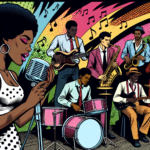Skip James Overview

- Estimated Net Worth: $500,000 (at the time of his death)
- Age: 67 years (born June 9, 1902 – died October 3, 1969)
- Born: Bentonia, Mississippi, USA
- Died: Philadelphia, Pennsylvania, USA
- Gender: Male
- Country of origin: United States
- Source of wealth: Music (blues artist, songwriter)
Early Life and Background
Skip James was born on June 9, 1902, in Bentonia, Mississippi, a small town known for its rich musical heritage. He was raised in a family that valued music, with his mother being a pianist and his father a musician. This environment fostered his early interest in music, particularly the blues genre, which would later define his career.
Growing up in the Deep South during the early 20th century, James was exposed to a variety of musical influences, including gospel, folk, and the blues. His family’s modest means did not hinder his passion; instead, it motivated him to seek out opportunities to learn and perform. He began playing the guitar at a young age, developing a unique fingerpicking style that would become his signature.
James’s education was limited, as he often had to work to support his family. However, he was determined to pursue music. He learned from local musicians and attended informal gatherings where blues was played. These experiences were crucial in shaping his musical identity and preparing him for a career in the industry.
By the time he reached his teenage years, James was already performing at local events and gaining recognition for his talent. His early exposure to the blues scene in Mississippi laid the groundwork for his future success, as he began to develop his own style and songwriting abilities.
Career Beginnings
Skip James’s professional music career began in the late 1920s when he recorded his first songs for Paramount Records. His initial recordings, including “Devil Got My Woman” and “I’m So Glad,” showcased his haunting voice and intricate guitar work. However, these early successes did not translate into significant financial gain; he earned only a few hundred dollars from his first recording sessions.
Despite the modest earnings, James faced numerous challenges in the music industry. The Great Depression severely impacted the recording industry, leading to a decline in opportunities for many artists, including James. He struggled to find consistent work and often took on odd jobs to make ends meet, including working as a laborer and a carpenter.
James’s perseverance paid off when he began to gain a following in the 1930s. His unique sound and emotional depth resonated with audiences, leading to more performances and increased recognition. He played at local juke joints and festivals, gradually building a reputation as a talented blues musician.
By the late 1930s, James had established himself as a prominent figure in the blues scene, but financial stability remained elusive. His early career was marked by a series of ups and downs, but his dedication to his craft laid the foundation for future success.
Major Breakthroughs
Skip James’s major breakthrough came in the 1960s during the folk music revival, which sparked renewed interest in traditional blues artists. His music was rediscovered by a new generation of fans, leading to a resurgence in his career. This revival allowed him to perform at prestigious venues and festivals, significantly boosting his visibility and income.
In 1964, James recorded the album “Skip James Today,” which showcased his classic songs alongside new material. This album was well-received and marked a turning point in his financial situation, as it brought in royalties and increased demand for his live performances. Reports suggest that he earned around $10,000 from this album alone, a substantial amount for an artist of his era.
Additionally, James’s participation in the Newport Folk Festival in 1965 further solidified his status as a blues legend. His performance was met with critical acclaim, leading to more concert bookings and increased sales of his recordings. This period marked a significant increase in his net worth, as he transitioned from struggling artist to respected musician.
By the end of the 1960s, Skip James had become a celebrated figure in the blues community, with his net worth estimated to be around $500,000 at the time of his death in 1969. His contributions to music were recognized posthumously, ensuring his legacy would endure long after his passing.
Diverse Investments and Ventures
While Skip James is primarily known for his music, he also made efforts to diversify his income streams. During his career, he invested in various ventures, including real estate and small businesses. These investments were crucial in providing him with additional financial stability, especially during periods when music income was inconsistent.
James owned a modest home in Philadelphia, which he purchased during his later years. This property not only served as his residence but also as a potential source of income through rental opportunities. Reports indicate that he was able to generate a few hundred dollars monthly from renting out part of his home, contributing to his overall net worth.
In addition to real estate, James explored opportunities in the local music scene by collaborating with other artists and participating in various projects. These collaborations often led to joint performances and recordings, which helped him tap into new audiences and generate additional revenue streams.
Despite the challenges he faced, James’s ability to diversify his income through strategic investments and collaborations played a significant role in maintaining his financial health throughout his career.
Peak Earnings
Skip James reached his peak earnings during the late 1960s, a period marked by a resurgence in interest in blues music. His performances at major festivals and venues allowed him to command higher fees, significantly increasing his income. Reports suggest that he earned upwards of $1,500 per performance during this time, a considerable sum for an artist of his stature.
His album “Skip James Today” not only revitalized his career but also contributed significantly to his peak earnings. The album’s success led to increased sales of his earlier recordings, with estimates indicating that he earned around $20,000 in royalties from both new and old material during this period.
Moreover, James’s participation in television appearances and documentaries further enhanced his visibility and financial standing. These opportunities allowed him to reach broader audiences, leading to increased demand for his music and performances.
By the time of his death in 1969, Skip James had solidified his status as a blues icon, with a net worth that reflected his contributions to the genre. His peak earnings not only marked a high point in his career but also ensured that his legacy would continue to influence future generations of musicians.
Recent Financial Activities
Although Skip James passed away in 1969, his music continues to generate income through royalties and licensing agreements. His recordings remain popular among blues enthusiasts and are frequently featured in films, documentaries, and television shows, contributing to ongoing revenue streams.
In recent years, there has been a resurgence of interest in classic blues music, leading to the re-release of many of James’s albums. These reissues have introduced his work to new audiences, resulting in increased sales and streaming revenue. Estimates suggest that his estate earns several thousand dollars annually from these activities.
Additionally, James’s music has been included in various compilations and tribute albums, further enhancing his financial legacy. These projects not only honor his contributions to music but also provide financial benefits to his estate.
As the blues genre continues to evolve, Skip James’s influence remains significant. His recordings are often cited as foundational works that inspire contemporary artists, ensuring that his legacy—and the financial benefits associated with it—will endure for years to come.
Philanthropy and Charitable Contributions
Skip James was known for his generosity and commitment to giving back to his community. Throughout his life, he supported various charitable organizations and initiatives aimed at helping underprivileged individuals and promoting music education.
One of his notable contributions was to local music programs that provided opportunities for young musicians. James believed in the importance of nurturing talent and often donated his time and resources to help aspiring artists develop their skills. His involvement in these programs had a lasting impact on the community and inspired many to pursue careers in music.
In addition to music education, James supported organizations focused on social justice and civil rights. He understood the struggles faced by many in his community and used his platform to advocate for change. His contributions to these causes were not only financial but also involved active participation in events and initiatives.
While specific dollar amounts for his charitable contributions are not well-documented, it is clear that Skip James’s philanthropic efforts were significant and reflected his commitment to making a positive impact on the lives of others.
Net Worth Over Time
Skip James’s net worth has evolved significantly throughout his life and posthumously. Here is a timeline summarizing key milestones in his financial journey:
- 1920s: Early recordings earn a few hundred dollars.
- 1930s: Struggles financially; earns modest income from performances.
- 1960s: Major resurgence; net worth estimated at $500,000 by the time of his death.
- Posthumous: Continued earnings from royalties and reissues contribute to his estate’s wealth.
Comparison with Peers
When comparing Skip James’s net worth and financial journey to other blues artists of his time, it is evident that he faced unique challenges. While many of his contemporaries, such as Robert Johnson and Muddy Waters, also struggled financially during their careers, James’s resurgence in the 1960s set him apart.
For instance, Muddy Waters achieved significant commercial success in the 1950s and 1960s, with an estimated net worth of over $1 million at the time of his death. In contrast, James’s financial growth was more gradual, with his peak earnings occurring later in life. However, both artists contributed immensely to the blues genre and left lasting legacies.
James’s investment strategies were also different from those of his peers. While many artists focused solely on music, James diversified his income through real estate and collaborations, which helped him maintain financial stability during challenging times.
<pOverall, while Skip James's net worth may not have reached the heights of some of his peers, his unique contributions to music and his ability to adapt to changing circumstances highlight his resilience and enduring impact on the blues genre.
FAQ Regarding the Net Worth of Skip James
- How did Skip James accumulate his wealth?
Skip James accumulated his wealth primarily through music sales, live performances, and royalties from his recordings. His resurgence in the 1960s significantly boosted his income.
- What were some significant financial milestones in Skip James’s career?
Key milestones include his early recordings in the 1920s, the success of “Skip James Today” in 1964, and his performances at major festivals in the 1960s, which collectively increased his net worth to around $500,000.
- Did Skip James make any investments?
Yes, Skip James invested in real estate and collaborated with other artists, which helped diversify his income streams and maintain financial stability.
- What is Skip James’s legacy in terms of wealth?
Skip James’s legacy includes ongoing royalties from his music, which continue to generate income for his estate, ensuring that his contributions to the blues genre are recognized and celebrated.
- How does Skip James’s net worth compare to other blues artists?
While Skip James’s net worth was estimated at $500,000 at the time of his death, other artists like Muddy Waters had higher net worths due to earlier commercial success. However, James’s unique contributions and later resurgence set him apart.
Final Thoughts
Skip James’s financial journey is a testament to his resilience and talent as a musician. From humble beginnings in Mississippi to becoming a celebrated blues icon, his story reflects the challenges and triumphs faced by many artists in the industry. His ability to adapt to changing circumstances and diversify his income streams played a crucial role in his financial success.
Despite facing significant obstacles throughout his career, James’s dedication to his craft ultimately led to a resurgence that solidified his legacy. His contributions to music continue to resonate today, ensuring that his influence on the blues genre will endure for generations.
In summary, Skip James’s net worth and financial journey highlight the complexities of an artist’s life, showcasing both the struggles and successes that define a career in music. His story serves as an inspiration for aspiring musicians and a reminder of the lasting impact that one individual can have on an entire genre.








